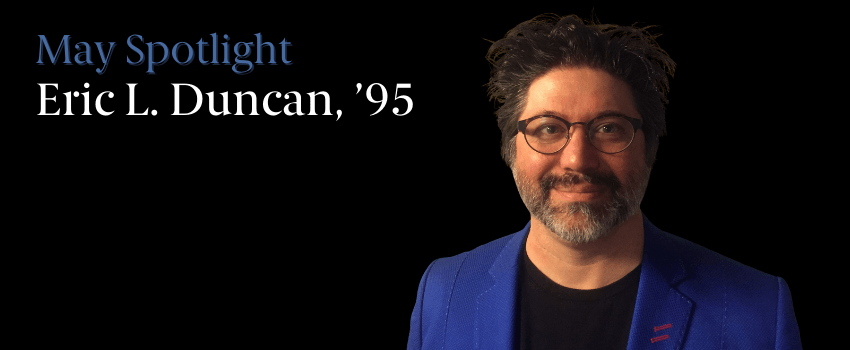Eric L. Duncan graduated with a Bachelor of Music in composition in 1995. He is the Chief Technology Officer of Synergi Partners and co-owner of Columbia area restaurants Bourbon, Black Rooster and The Dragon Room. We caught up with Eric to discuss his time at the School of Music and current career.
Why did you choose the USC School of Music?
I originally chose the University of South Carolina for a different discipline, but changed my major to Music Composition the first day of orientation. I didn't really evaluate the School of Music so much as to decide (rather impulsively) to throw my hat in. I reaped so many benefits from my time at the School of Music, and I attribute so much of my success to what I learned from that program. it's incredible to me now to reflect on the importance of that decision.
What ensembles did you perform with while at USC?
What person, course or experience was most influential for you while at the School of Music?
There are just so many people - Dr. Fred Teuber, Dr. Jerry Curry, Dick Goodwin, Dr. Reginald Bain to name a few - that elevated and expanded my perception of music, art, the world around me and taught me by example that, when it looks like there is no solution or path forward, it's likely because my viewpoint needs to change.
How has your education at the School of Music helped you in your life and career?
There are several skills that my degree enhanced, including time management, the ability to work alone or collaborate in a group, self-assessment and personal responsibility, and the ability to approach problems from a creative or unique viewpoint. While all of these are skills are needed in order to be an effective performer or artist, for me they equally helped me in my careers in business and information technology. The number of transferable skills that one gains as a music major really can't be understated.
What is one of your favorite memories, classes, professors or activities while attending the School of Music?
During a year of study abroad at the Université de Haute-Alsace, I had the opportunity to travel to Paris to see the premiere of Roland by Lully; an opera that had not been performed since 1755. The performance itself was in the Théâtre des Champs-Elysées, the same venue where Stravinsky's Rite of Spring caused a riot in 1913. Being in that space was incredible and the performance was incredible. However, the rest of the audience did not care for the lead soprano. A fact they made very, very, very clear during the curtain calls. It wasn’t anything even close to a riot, but prior to that experience the idea of a music or dance performance causing a riot was a completely foreign concept to me. After that, not so much.
What advice would you give current students or recent graduates pursuing a music performance or music education career?
Be fearless. You have a myriad of transferable skills that can keep you afloat career wise if you are not successful, so don’t slow down or pause out of any fear of failure.
What is one of your proudest professional or personal accomplishments that occurred after graduating from the School of Music?
My education has played a significant role in everything I do. I am really happy about the success of Bourbon and Black Rooster and the opportunity those restaurants provide to continue supporting the arts through hospitality. I am also very proud of my career in Information Technology, in part because for me that entire career path was born out of the skills I learned from my degree in music.
Any upcoming performances or pieces?
I am currently working on some new music for the Bourbon Quartet (Jennifer Parker-Harley, flute; Ari Streisfeld, violin; Claire Bryant, cello; Mike Harley, bassoon) that has not yet been scheduled, but will hopefully be performed in the fall of 2023.
